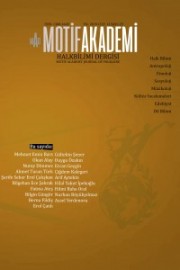BALKAN VE TRAKYA COĞRAFYASINDA KÖKLÜ BİR HALK KÜLTÜRÜ VARLIĞI: GUSLARİLİK (HALK ŞAİRLİĞİ) VE PESNA (HALK EZGİSİ)
A ROOTED FOLK CULTURE AT THE BALKANS AND THRACE REGION: THE PRACTICE OF GUSLARI (MINSTRELS) AND PESNA (FOLK TUNE)
Author(s): Okan AlaySubject(s): Cultural history, Customs / Folklore, Oral history, Evaluation research
Published by: Motif Halk Oyunları Eğitim ve Öğretim Vakfı
Keywords: Balkans; Ottoman period;
Summary/Abstract: Oral culture including oral narrative/tradition and literature not only holds the adventure of thousands of years of the society it belongs intrinsically but also serves as a resource for the written culture. It is transferred from one generation to another through representatives such as bards, minstrels and saga tellers. One of the agents known by names such as “bard”, “minstrel”, “shaman”, “kıssahan” (saga teller) is “guslari” as known at the Balkans and Thrace region. Although some differences are found between guslari, who perform melodious poems and narratives with the musical instrument called “gusle” of the minstrels in Anatolia and the minstrels, there are some similarities in terms of the performance of minstrel tradition. The characteristics of the practice of Guslaris embody remarkable features with their status in the tradition, their world of narration and performance aspect. It is noted that apart from the historical background of the practice of Guslari, the Turkish-Islamic cultural atmosphere and tradition of being minstrels left traces on the Guslari from the Balkans, especially in Ottoman period.
Journal: Motif Akademi Halkbilimi Dergisi
- Issue Year: 12/2019
- Issue No: 25
- Page Range: 21-30
- Page Count: 10
- Language: Turkish

